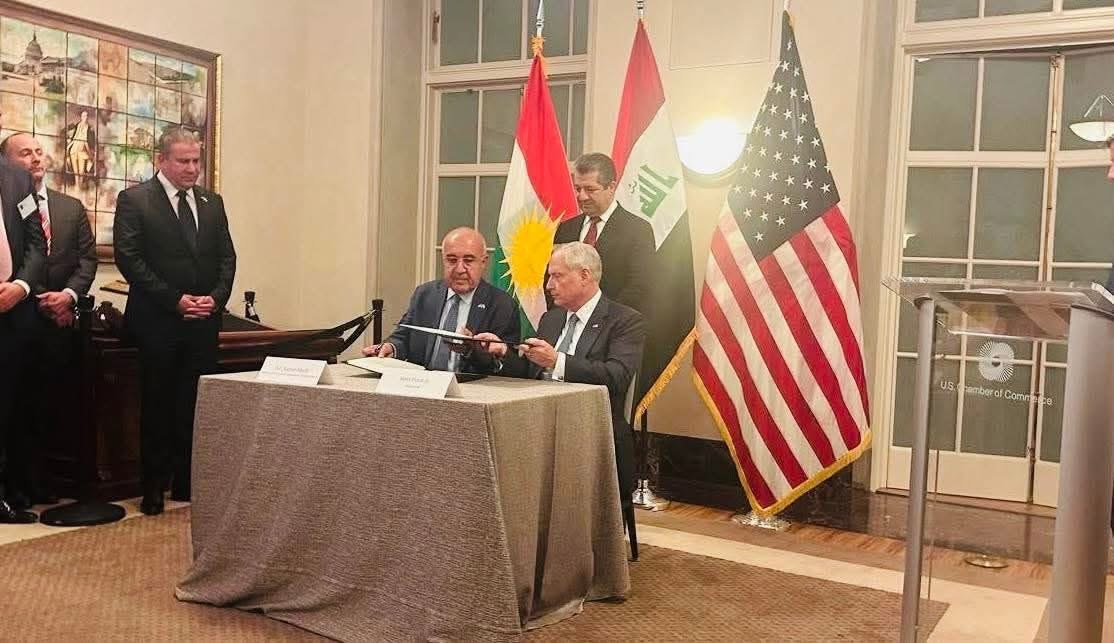Kurdistan Regional Government KRG announced two significant energy agreements with American companies, potentially worth $110 billion over their lifetimes. The deals aim to develop major gas fields and address electricity shortages across the region.
New Gas Development Projects Launched
Kurdistan Regional Government (KRG) Prime Minister Masrour Barzani officially signed agreements with HKN Energy and WesternZagros during a ceremony at the US Chamber of Commerce in Washington, D.C. The contracts focus on developing the Miran Gas Field and the Topkhana-Kurdamir blocks.
According to senior KRG advisor Bayan Sami Abdul Rahman, HKN will develop the Miran Gas Field, estimated to contain 8 trillion cubic feet of gas. Simultaneously, WesternZagros will work on the Topkhana-Kurdamir blocks, which reportedly hold approximately 5 trillion cubic feet of gas and 900 million barrels of oil.
The KRG Ministry of Natural Resources clarified that these agreements “are not new” but are instead longstanding contracts with only the contracting companies changing “within the framework of legal and contractual procedures outlined in the agreements.” The Ministry stated that Iraqi courts have reviewed and confirmed the legality of these arrangements.
Production Plans and Regional Energy Needs
Initial development at the Miran field will focus on meeting domestic energy requirements. Acting Natural Resources Minister Kamal Mohammed told reporters that the first phase, expected to last 18-20 months, aims to produce between 50-70 million standard cubic feet of gas daily before scaling up operations.
Mohammed noted the region’s significant energy gap: “We produce more than 8,000 MW but the gas we produce can only suffice the production of 4,500 MW,” explaining why many residents currently rely on private diesel generators.
The agreements coincide with the KRG’s “Runaki” initiative, which seeks to provide continuous electricity across Kurdistan by late 2026. Electricity shortages have been a persistent issue in the region due to high demand, limited fuel supplies, and financial constraints preventing power stations from operating at full capacity.
Political and Regional Context
The energy deals occur amid complex regional dynamics. In March, the United States revoked a waiver that had allowed Iraq to purchase electricity from Iran as part of Washington’s pressure campaign against Tehran. US officials have indicated they hope Baghdad will utilize Kurdistan’s gas resources instead.
Baghdad has been working to develop its own gas fields, diversify energy sources, and reduce dependence on Iranian imports by exploring agreements with Gulf states, Turkey, and Turkmenistan, while also investing in renewable energy.
The contracts were signed without consultation with the federal government in Baghdad, according to Minister Mohammed, though he maintained they serve the interests of all Iraq. This reflects ongoing tensions regarding resource management authority between the KRG and the central government.
KRG Interior Minister Rebar Ahmed characterized the agreements as evidence that “the Kurdistan Region is trusted by major international companies,” speaking at the 15th Erbil International Building, Construction and Machinery Exhibition.
Business representatives expressed optimism about the partnerships. Ross Perot Jr., an investor involved in the agreement, noted they have been working with Kurdistan for 18 years and that 81 percent of their employees are Kurds. HKN Energy’s Vice President of Operations Rasmus Engell described a “special relationship” between American businesses and Kurdistan.
The US Chamber of Commerce plans to visit Kurdistan on June 23 with a business delegation, according to Steve Lutes, the chamber’s vice president, who encouraged companies “across all sectors of the economy” to participate.
As implementation begins, these projects potentially represent significant developments for both Kurdistan’s energy autonomy and Iraq’s broader electricity infrastructure, though challenges remain in navigating the complex political framework of Iraq’s federal system.


